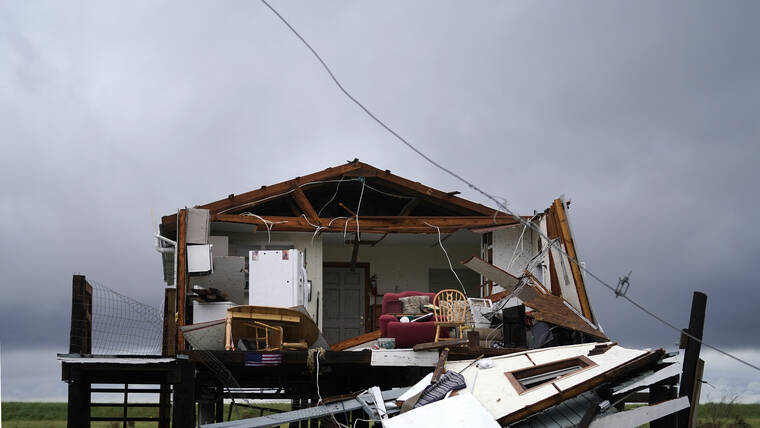POINTE-AUX-CHENES, La. — Residents of southern Louisiana still recovering from Hurricane Ida just weeks ago were bracing Wednesday for expected heavy rains as Nicholas crawls across parts of the state from Texas.
Nicholas made landfall as a hurricane early Tuesday on the Texas coast, dumping heavy rain even though it was quickly downgraded to a tropical storm and later a depression. But forecasters said Nicholas could stall over storm-battered Louisiana and spread life-threatening floods across the Deep South over the coming days.
In a state still recovering from Category 4 storm Ida weeks ago — as well as Category 4 Laura a year ago — Nicholas and its potentially heavy rain bands were unwelcome news.
Louisiana Gov. John Bel Edwards warned residents to expect flash flooding and to take the storm seriously despite its lack of hurricane status.
“This is a very serious storm, particularly in those areas that were so heavily impacted by Hurricane Ida,” Edwards said.
Galveston, Texas, recorded nearly 14 inches (35 centimeters) of rain from Nicholas, the 14th named storm of the 2021 Atlantic hurricane season, while Houston reported more than 6 inches (15 centimeters). The New Orleans office of the National Weather Service said late Tuesday that as much as 10 inches (25 centimeters) of rain could fall in parts of Louisiana, with some areas seeing particularly intense periods of 2 to 3 inches (5 to 8 centimeters) of rainfall per hour.
In the small Louisiana community of Pointe-aux-Chenes, Ida peeled open the tin roof of Terry and Patti Dardar’s home, leaving them without power and water for more than two weeks since. Nicholas made the damage that much worse, soaking the upstairs. But it also provided them with badly needed water, which their son Terren and grandchildren collected in jugs and poured into a huge plastic container through a strainer. From there, a pump powered by a generator brought the water inside.
His mom, Patti, said the family didn’t have anywhere else to go after Ida, so members were doing their best during Nicholas.
“We ain’t got no other place,” she said. “This is our home.”
Gov. Edwards said Nicholas will complicate an already difficult recovery from Ida in southeast Louisiana. He noted that 95,000 electric customers were still without power more than two weeks after Ida hit. And he said the new storm could mean some who had regained power might lose it again. Homes already badly damaged by Ida were not yet repaired to the extent that they could withstand heavy rain, Edwards added.
Energy companies working to restore power to remaining areas in the state said Wednesday that they were watching Nicholas closely but didn’t expect it to affect their restoration times.
A spokesman for Entergy Louisiana said Nicholas so far has not caused any delays to previously announced times to restore power. Crews cannot operate when lightning is within 10 miles (16 kilometers) and can’t put bucket trucks in the air at winds greater than 30 mph (50 kph), said Jerry Nappi. But once conditions improve they would quickly resume work.
Joe Ticheli, manager and CEO of South Louisiana Electric Cooperative Association, said he did not anticipate that Nicholas would significantly slow its work to restore power after Ida. He said rain — the main threat from Nicholas — really doesn’t stop the linemen who are generally outfitted with slicker suits and grit, he said.
“These are tough guys, and they relish all of this,” he said. The coop services about 21,000 customers across five parishes including parts of the hard-hit Terrebonne and Lafourche parishes. Ticheli said the coop has returned power to about 75% of its customers with the remaining 25% mostly in the hardest-hit parts of southern Terrebonne parish.
In the weather-battered city of Lake Charles, in southwestern Louisiana, Mayor Nic Hunter said ahead of Nicholas the city prepositioned assets should they be needed, and city crews scoured the drainage system to keep it free from debris that might cause clogs and flooding.
Lake Charles was hammered by Hurricane Laura last year, a Category 4 storm that caused substantial structural damage across the city of nearly 80,000 residents. Weeks later Hurricane Delta ripped through the same area. Freezing temperatures in January burst pipes across the city and then a May rainstorm swamped houses and businesses yet again.
After multiple natural disasters in such a short period of time, Hunter said he’s worried about residents’ state of mind.
“With what people have gone through over the last 16 months here in Lake Charles, they are very, understandably, despondent, emotional. Any time we have even a hint of a weather event approaching, people get scared,” he said.
——
Santana reported from New Orleans. Associated Press reporters Kevin McGill in New Orleans and Juan A. Lozano in Surfside Beach, Texas contributed to this report.


